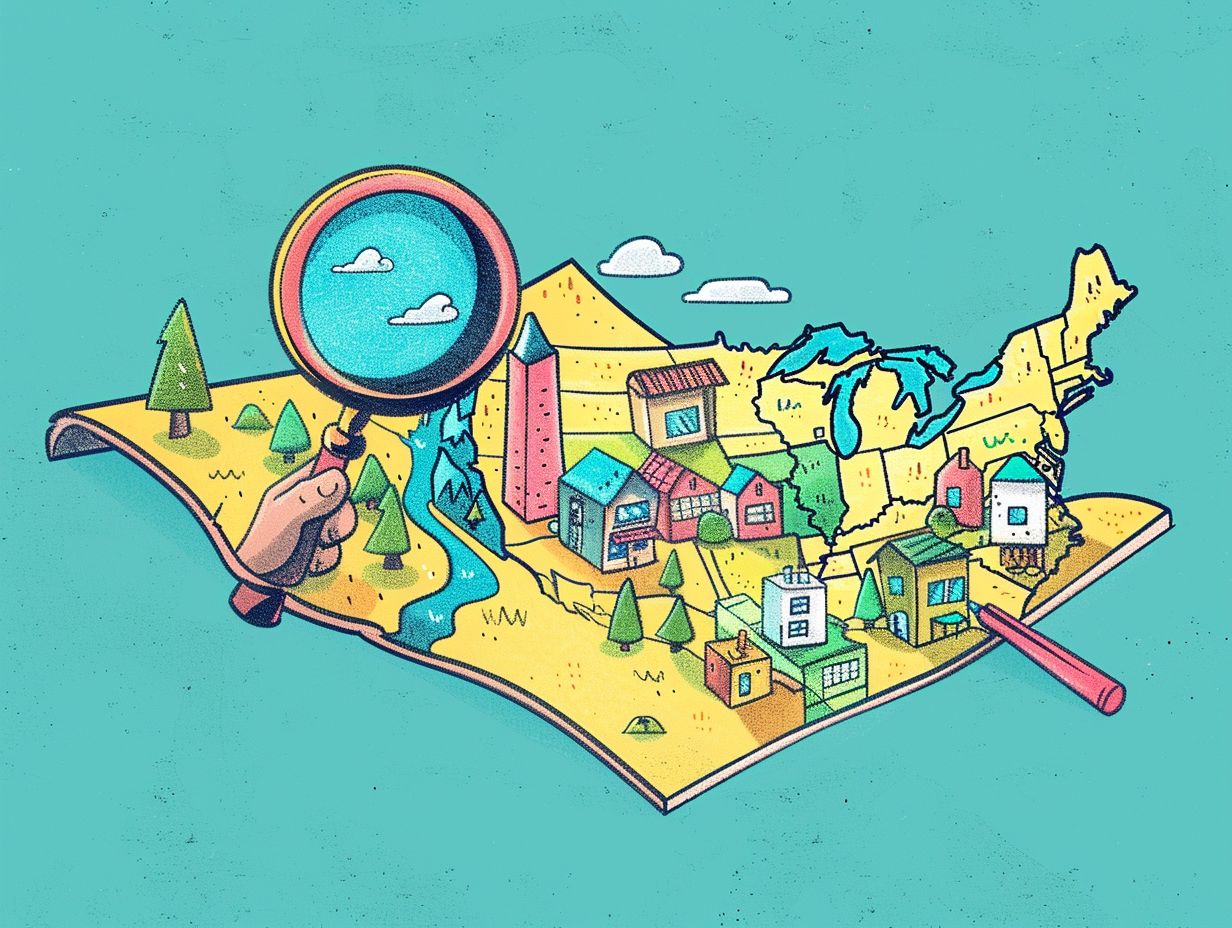Affordable housing is a pressing issue that affects communities and individuals all over the United States. Things like the cost of living, income levels, and housing market trends can really impact your ability to find a good place to live.
Let’s talk about why affordable housing is so crucial, check out the resources you can use to find affordable housing, and share some tips to help you navigate the process like a pro.
Whether you’re renting for the first time or thinking about downsizing, make sure to focus on what you really need and arm yourself with knowledge to make smart choices when looking for your next home.
The Importance of Affordable Housing

Affordable housing is a big deal in the United States, affecting not only the housing market but also the lives of low-income families like yours who are trying to find a place to rent or dream of owning a home.
Making sure there are affordable rent options and offering housing assistance through different programs is key to meeting your housing needs and giving you new opportunities for housing. These solutions can help you tackle housing challenges and give you the support you need to find the housing that works best for you.
Impact on Communities and Individuals
The impact of affordable housing on communities and individuals can be profound, influencing everything from economic stability to social well-being. You should know that affordable housing policies, like public housing initiatives, Section 8 assistance, and housing vouchers, are crucial tools in tackling the housing crisis. They ensure that people from different socio-economic backgrounds can access quality, affordable apartments. These initiatives not only give a safe and stable living space but also boost local economies by encouraging spending and creating jobs within communities. By providing housing subsidies and support, these programs assist in overcoming the obstacles faced by low-income families, ultimately contributing to a fairer society.
Factors Affecting Housing Affordability
In the United States, you’ll notice that housing affordability is influenced by various factors like housing market trends, increasing housing costs, and the overall housing affordability index.
Cost of Living and Income Levels
The cost of living and income levels are essential factors that affect housing costs and, in turn, housing affordability for you.
The fluctuation in the cost of living and variation in income levels play a crucial role in determining how accessible housing is for you and your family. When the cost of living is high and your income is low, it can create significant challenges for many individuals in finding affordable housing options.
In areas where the cost of living is relatively lower and incomes are higher, housing affordability tends to be less of a worry for you. The interaction between these factors shows the intricate nature of housing affordability issues and the necessity for targeted solutions to tackle them.
Housing Market Trends

To address the housing shortage and plan for future development, you need to have a good grasp of housing market trends.
Recent studies indicate a growing demand for affordable housing, which has driven up prices in big cities. This increase in pricing has made it tough for first-time buyers to enter the market. In response, developers are now working on building mixed-income housing projects to accommodate a wider range of potential buyers.
There’s also a noticeable trend towards sustainable housing methods, with a focus on energy-efficient designs and eco-friendly materials in new construction projects.
Resources for Finding Affordable Housing
When you’re on the hunt for affordable housing, it can feel like searching for a needle in a haystack. But don’t worry, there are plenty of resources out there ready to lend a hand. From housing assistance programs to specially designed housing initiatives for low-income families and individuals, you’ve got options to explore.
Government Programs and Assistance
Government programs and assistance are here to have your back with a range of housing support options like public housing, Section 8, and housing vouchers. They’re all geared towards helping out low-income folks like yourself by offering affordable housing choices.
Public housing, run by local public housing agencies, hooks you up with rental units at rates lower than the market for those who qualify.
Alternatively, the Section 8 program, also known as the Housing Choice Voucher program, lets you take the lead in finding your spot and kicks in some cash towards your monthly rent. These programs come with their own set of rules and guidelines to make sure everyone has a fair shot at housing that won’t break the bank.
Non-Profit Organizations
You play a crucial role in providing affordable housing and housing support to those in need. Non-profit organizations like yours offer different types of housing assistance, including subsidized rental housing, transitional housing for individuals experiencing homelessness, and affordable homeownership programs. Plus providing physical housing units, you also offer support services like financial education, counseling, and employment assistance to help individuals and families maintain stable housing situations.
Your partnerships with government agencies, developers, and community members in the affordable housing sector work to address housing challenges and create sustainable solutions for those facing housing insecurity.
Tips for Finding Affordable Housing

When looking for affordable housing, you need to do some strategic planning and really get a handle on things like how much rent you can afford, what housing expenses you’re up against, and what kind of housing options are out there.
Budgeting and Prioritizing Needs
In terms of finding affordable housing, you need to be on top of your budgeting game and prioritize your housing needs.
Understanding why it’s crucial to create a detailed budget that covers all housing expenses, like rent or mortgage payments, utilities, maintenance, and insurance, is key to keeping your finances in check. Setting specific financial goals, such as saving a percentage of your income for housing costs, will help you make smart choices about where you live.
Don’t be afraid to explore ways to save money, like downsizing or finding a roommate. These strategies can help cut down your monthly housing expenses and give you more financial flexibility for other important needs.
Location and Transportation Considerations
When you’re deciding on the perfect location, think about transportation options and how they impact the overall affordability of housing. Reliable public transportation can really cut down on your commuting costs, making it easier to snag a place that fits your budget.
Areas with great transit systems tend to be pricier due to high demand. But if you’re willing to live in a more secluded spot, you might find more affordable options – just be prepared for higher transportation expenses.
Being close to major highways or public transit hubs can also affect the availability and cost of apartments. For many renters, convenience and accessibility play a huge role in choosing a place to live.
Negotiating Rent and Lease Terms
When you’re trying to negotiate rent and get better lease terms, it can really make a difference in cutting down your housing expenses and finding a place that fits your budget.
As you dive into negotiating rent, the key is to do your homework and check out the current market rates in the area. This way, you’ll have a good idea of what’s a fair price for the property you’re interested in. Plus, building a positive relationship with the landlord or property manager can come in handy when you’re in the middle of negotiations. Offering to sign a longer lease or being flexible with your move-in date can be useful bargaining tools to help lower that monthly rent. Just remember, being prepared and standing your ground during negotiations can result in some significant savings in the long haul.
Frequently Asked Questions

What is considered affordable housing in the United States?
Affordable housing is defined as housing that costs no more than 30% of a household’s income. This includes rent or mortgage payments, as well as utilities and other housing-related expenses.
How can I find affordable housing in the United States?
There are a few ways to find affordable housing in the United States. You can search online for government-subsidized housing programs, contact local housing authorities, or work with a housing counselor to explore your options.
Are there any income requirements for affordable housing in the United States?
Yes, there are often income requirements for affordable housing in the United States. These requirements vary depending on the location and type of housing, but typically require that your household income falls below a certain percentage of the area median income.
What are some common types of affordable housing in the United States?
Common types of affordable housing in the United States include public housing, privately owned subsidized housing, and low-income housing tax credit properties. There are also programs that provide rental assistance or vouchers to help individuals and families afford housing.
Can I apply for affordable housing in the United States if I am not a US citizen?
Yes, non-US citizens are often eligible for affordable housing programs in the United States. However, the specific requirements may vary depending on your immigration status and the program you are applying for.
How can I determine if a housing option is truly affordable for me?
To determine if a housing option is affordable for you, it’s important to consider your overall budget and financial situation. Make sure to factor in all housing-related expenses, as well as your other monthly expenses, to see if the cost fits within the recommended 30% of your income.